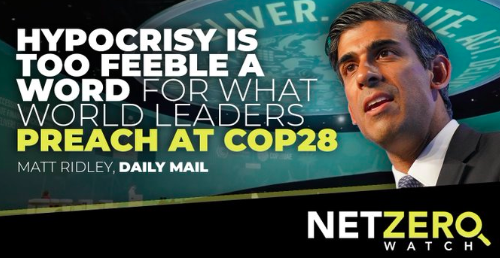As regular readers know, I have been tracking the U.N. development of the so-called “loss and damage” issue for several years. This has been a very dangerous concept.
As promoted by the extreme alarmists, it contemplates America and other developed countries paying trillions of dollars in reparations to developing countries for the supposed damages due to climate change we have caused. There have been future damage estimates as high as $400 trillion.
At COP 27 last year, an official loss and damage fund was launched but with no specific nature. That chore was left to today’s COP 28, and it has now been done, at least a very important little bit.
Happily, the official COP decision on the loss and damage fund has now been made, and it appears harmless. I sigh with relief.
Contributions to the fund are completely voluntary. There is no claim of reparation, obligation, compensation, nothing like that. It is simply a mechanism for rendering foreign aid for natural disasters. The agreement says this: “…funding arrangements, including a fund, for responding to loss and damage are based on cooperation and facilitation and do not involve liability or compensation.”
Of course, the alarmists are going to continue to describe it as a reparation fund, but that is just the usual hype. There is no there there.
Given that the US foreign aid budget runs around $30 billion a year, there should be no problem running a bit of that through the loss and damage fund, if and when it finally gears up. Initial contributions from various countries are running between $100 million and $10 million, which is almost nothing. My understanding is the US is kicking in a trivial $17.5 million. I suspect the US Government spends that much a year on unused airplane tickets.
Nor is this $100 million a year just a single donation. The UN’s flagship Green Fund only gets about $9 billion every five years, which is just $2 billion a year. If loss and damage do that well it is still insignificant compared to the $400 trillion hype. So, for now the loss and damage threat has simply ceased to exist. It consists of voluntary peanuts.
Mind you, one big fight lies ahead, but America and the other developed countries may have little to do with it. The monster question is, who gets these peanuts?
Pretty much every country gets bad weather, which is what loss and damage funds are supposed to cover. Taken together, the developing countries’s losses and damages are huge compared to the likely funding. So, who is going to get what little there is?
The COP decision is perfectly silent on the substance of this fundamental question. But we do have a procedure of sorts.
First, there will be created a Board to oversee the fund, which should be a contentious process in itself. Then, the Board is supposed to develop the rules, which at some point have to include who qualifies to get funded for their losses and/or damages.
However, what the Board decides is then subject to the approval of the next COP, which is likely to be where the real fight happens. Given that every country that is not going to get funded can veto giving some other country funding, this could be a protracted process. It might even be unresolvable.
In fact, we have a bit of a model for an impasse. The next COP is supposed to be in Eastern Europe, but no agreement on where can be reached because every possibility has been vetoed to date.
I am not making this up. Getting every Eastern European country to agree on who, instead of them, should get the enormous cash flow of 70,000 two-week visitors may not be possible. This one-shot COP income may well exceed all the loss and damage funding. It would be hilarious if COP 29 did not occur for this reason.
In any case, the news is great. The extremely dangerous loss and damage issue has been rendered harmless. It might even be paralyzed. One can hope, and time will tell.


